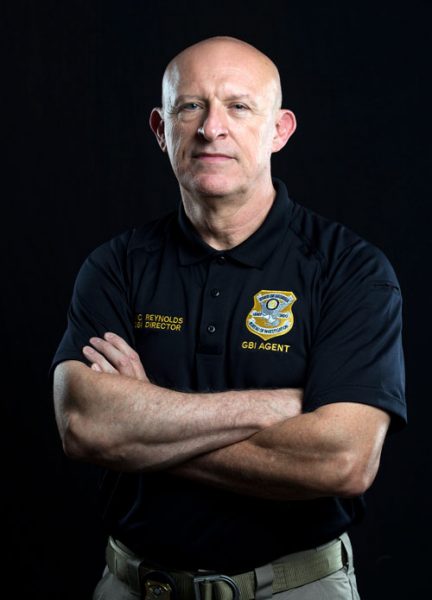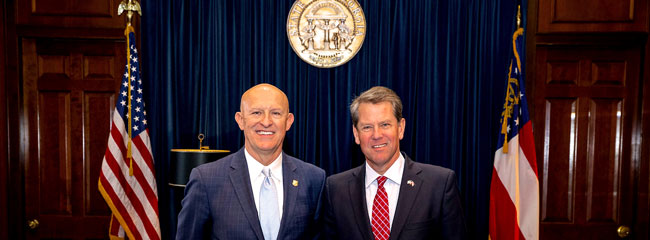Doing the Right Thing
Georgia Southern Alumnus Appointed Georgia’s Top Cop


Vic Reynolds (‘79), director of the Georgia Bureau of Investigation (GBI), says one of the most valuable lessons he ever learned about law enforcement came from Richard Waugh, a beloved former criminal justice professor at Georgia Southern.
“He always emphasized that law enforcement was one of those careers where, if you chose to do so, you could always do the right thing,” he said. “I used to tell it to young prosecutors when I taught them…and I want to relay it to my young agents now.”
Reynolds was appointed GBI director in February, and now leads the statewide agency of more than 900 employees that provide assistance with criminal investigations, forensic lab services and computerized criminal justice information. The role is the culmination of Reynolds’ wide-ranging, 40-year career in law enforcement, where “doing the right thing” served as a reliable compass.
Before his appointment, Reynolds served as a police officer, prosecutor, judge, defense attorney and most recently, Cobb County District Attorney.
“I’ve been everything in the courtroom except the defendant, and I’m going to keep it that way if I can,” he said.
Reynolds says he developed a strong sense of right and wrong while growing up in the Celanese Mill Village in Rome, Georgia. Comprised of only 410 houses, the small textile mill village was a world unto itself.

“Your world was relatively small then,” said Reynolds. “I think particularly growing up the way I did in that time period you develop a pretty strong sense of what you determine is right or wrong.”
This moral compass has led him to approach the application of the law in interesting ways. During his tenure as Cobb County District Attorney, he faced a heroin and opioid epidemic. Instead of trying to eliminate the problem through arrests and imprisonment, Reynolds began pushing long-term treatment as the solution — and even used money seized from drug traffickers to help fund treatment facilities and sponsor reentry programs for recovering addicts.
“Our No. 1 charge is to keep this state as safe as we can,” said Reynolds. “And there’s a number of different ways to do it. It’s not always sending people to prison.”
At times, however, the right thing is prosecuting criminals to the full extent of the law, as Reynolds did in the “hot car case” that gained national media attention. In June 2014, Cobb resident Justin Ross Harris was accused of purposefully leaving his 22-month-old son to die in the back seat of his car in sweltering 90-degree weather. As his son died, the married father was texting explicit messages to other women, some of them underage. Prosecutors said they were shaken by the depravity in Harris’ behavior.
“And the truth is, you can have a voice in making sure that the small percentage of people who simply don’t deserve to breathe the same air that you and I do — you can work a good, strong case and make sure they don’t,” he said.
Harris was sentenced to life in prison in December 2016.
As Reynolds approaches his first full year as GBI director, he’ll face even greater challenges. Law enforcement at every level is dealing with transparency issues and how it interacts with the public. Cyber crime is on the rise and gang activity counts for between 48 and 90 percent of all violent crime. Both are priorities for Georgia Gov. Brian Kemp, and both require the GBI to lead the charge.
“There’s no doubt we’ve got our work cut out for us,” he said.
To get it done, he’ll follow the steps he’s taken to rise from a police officer to Georgia’s top cop: outwork your competition, treat other people the way you want to be treated, develop a strong moral compass and always, always try to do the right thing.
— Doy Cave

“I Never Dreamed”
Reynolds recounts unforgettable experience at Georgia Southern
Vic Reynolds doesn’t recommend enrolling at Georgia Southern the way he did.
He applied and enrolled sight unseen, a risky move that he says paid off in the end for him. As a student, he not only reconnected with Holly Holder, a friend from his hometown of Rome, Georgia, who is now his wife of more than 39 years, but he also had an unforgettable experience in 1977, when Lynyrd Skynyrd came to Georgia Southern.
“I had a fraternity brother who was on student government, and he wrangled it some way or the other where we actually went out on a Tuesday evening and picked Lynyrd Skynyrd up at the small Statesboro airport,” he said. “They rehearsed on Wednesday, and we got to go to the rehearsal. Then they played on Thursday.”
Not only did he get to drive the band around, he actually got to hang out with the band at their hotel. Reynolds, who still plays guitar, says he was sitting at the Holiday Inn with Skynyrd guitarist Allen Collins, listening to him play an old vintage Gibson guitar.
“He played it in front of me and said, ‘Somebody said you play,’ and handed it to me,” he recounted. “I said, ‘I don’t play like you do, man.’ But I actually got to play guitar with him right here at Georgia Southern!”
Lynyrd Skynyrd played Hanner Fieldhouse on Oct. 13, 1977. On Oct. 21, just a week later, the band’s plane crashed, killing lead singer Ronnie Van Zandt, guitarist and vocalist Steve Gaines, and backup singer Cassie Gaines.
— Doy Cave
